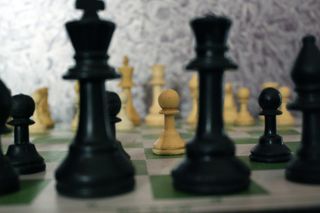
Empathy
Psychology of the Underdog
Why the weak sometimes win and the strong never learn.
Posted March 13, 2019
It might interest you to know that underdogs are doing increasingly well in the world. A study by Ivan Arreguin-Toft shows that in the last 200 years, weak actors prevail about 30% of the time in international conflicts, and this frequency seems to be steadily increasing. (More on this in a future post.) Generally speaking, individuals or groups who are at a disadvantage – whether measured in the form of lack of resources or allies – are many times able to prevail against overwhelming adversaries. Can science explain the counterintuitive and dramatic puzzle of the underdog victory?
Before you get too excited, the takeaway here is not that brute power doesn’t matter. The desire for more power (physical, financial, military, etc.) exists quite simply because, well, power really is useful. The Athenians understood this during the Peloponnesian War when they reminded the weaker Melians that “the strong do what they can and the weak suffer what they must.” Throughout the animal kingdom, as well as in our own species, formidability – or what some ethologists refer to as “resource holding potential” – translates rather directly into a greater probability of victory in contests between individuals and groups. Unsurprisingly, individuals with more “power” have a greater sense of entitlement, and are angrier when they don’t get their way. In chimpanzees, the best predictor of both the likelihood of conflict, and its outcome, is relative size. Quite simply, crude and conventional indices of power matter, and probably always will, because they are useful.
We must accept two realities: On the one hand, power matters because it is a timeless and reliable instrument that (largely) shapes contest outcomes. On the other hand, the weak have a rather stubborn tendency to triumph despite the odds against them. So, what determines whether power prevails or weakness overcomes?

Malcolm Gladwell tries to address just this question in his book David and Goliath. Although Gladwell offers many compelling factors that he believes explain the strength of the weak and the weakness of the strong, there is a common denominator that really stands out, yet surprisingly receives not a single mention in the book. This is what behavioral scientists call “theory of mind,” which refers to an individual’s capacity to infer the mental states of others. Individuals with damage to parts of the brain known to be responsible for this capacity exhibit an inability to understand the effects of their behavior on others and struggle with perspective-taking. How does this relate to our puzzle? Underdogs win not because they are smarter than their adversary, but because they understand their adversary better than their (stronger) adversary understands them.
David and Goliath spends most of its pages describing the conditions that facilitate uncommon endurance and guile among the weak and disadvantaged. These factors have already been discussed in many useful reviews, and include uncommon resolve, adaptability, creativity, experience with great loss, so-called "desirable disadvantage," and the mere fact that underdogs often fight for their life while the privileged typically have less at stake. Evolutionary biologists will recognize this as the familiar “life-dinner principle” that occurs between predator and prey. However, the book spends relatively less time explaining why the powerful are so often duped and blindsided by the tenacious. This leads to a new puzzle: Why is it so hard for the powerful to learn this lesson and stop getting duped? Is there something about being powerful that makes you irredeemably dense?
Consider again that in international relations, weak actors have prevailed against stronger adversaries about 30% of the time. Even though it seems remarkable that the weak can prevail over the strong 30% of the time, that's still a 70% failure rate. Putting aside things like ideology and principle for the moment, if all I care about is winning, then being the underdog really doesn’t seem all that attractive.
Gladwell makes the point repeatedly that although all of the subjects he interviewed understood that adversity made them stronger, almost none would wish that adversity on others. That’s a curious paradox, isn’t it? Yet, the paradox fades if we recognize that underdogs can win, but often don’t; power remains the winning bet.

All of this suggests that there is a perennial tug-of-war between the powerful and the weak, with the cards stacked ever in favor of the former. The problem is that being powerful is often such a good bet that it actually pays not to invest in a little strategic empathy; it’s very costly if you think about it. It is the mismanagement of this tradeoff by the powerful that leaves open a small but dramatic widow for those who possess just the right blend of cunning and commitment to bring down their Goliath. So why don’t the powerful learn? The answer is that most of the time, they don’t have to.

